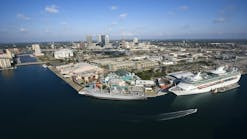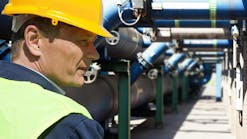Every day, Monika Freyman strives to more closely connect the scientific and financial fields as they relate to water. She serves as director of investor water initiatives at Ceres, a non-profit organization that works with leading companies, investors, public interest groups, policymakers, and other economic players to advance sustainable solutions in the water industry. The organization works to reduce carbon emissions and other pollutants, protect vital natural resources, ensure safe and just working conditions for employees, and reduce fossil fuel reliance while transitioning to a clean energy economy. Freyman researches corporate and investor exposure to risks related to growing water scarcity and water quality issues. She explores capital market solutions to these challenges and ways businesses and investors can more proactively manage water risks and limit impacts to water resources.
Recognizing that healthy water resources are an economic imperative, Freyman focuses her efforts on reshaping how economic factors value water and drive better water management. Freyman works with investors on deepening their integration of environmental, social, and governance factors—particularly with water—into portfolio management and engagement processes. Freyman directs the Investor Water Hub, a working group of the Investor Network on Climate Risk promoting peer-to-peer learning and is developing an investor water risk assessment approach. Freyman also studies water risks in shale energy development and supports the Water Program’s work on water issues across many sectors including agriculture, infrastructure, and municipal systems. Freyman has authored “An Investor Handbook for Water Risk Integration” and “Hydraulic Fracturing & Water Stress: Water Demand by the Numbers, Shareholder, Lender & Operator Guide to Water Sourcing” for Ceres.
What She Does Day to Day
“As director of investor water initiatives at Ceres, I predominantly speak with investors about how they can be financially exposed to water risks, issues, and opportunities,” notes Freyman. “I work with pension fund and mutual fund managers to improve their research processes to include an understanding of environmental and water risks, and how they can systematically assess and mitigate these risks in their investment decision-making. I also work with large companies about how they can more successfully speak with the investors that lend to them or own their shares about water risks and stewardship strategies. This work involves speaking at many meetings and events. I try to get out into the field as much as possible.”
What Led Her Into This Line of Work
Growing up in southern Alberta, Freyman would spend hours standing in a prairie pothole on the family farm collecting minnows and “observing the incredible diversity of organisms,” she notes. “I also very much enjoyed traveling throughout my life and university studies and appreciated the connectivity and information flow in financial markets. I married my love of ecology and water with finance by doing a degree in both and trying to connect the dots more closely between the two.”
Freyman earned a finance degree and holds a Chartered Financial Analyst designation. She also has an M.S. degree in Aquatic Ecology with a focus on Great Lakes wetlands and nutrient cycling.
Prior to going to work for Ceres, Freyman worked as a research consultant for the Initiative for Responsible Investment at Harvard, publishing a white paper that explored the roots of the concept of sustainability from a variety of fields to inform the Sustainable Accounting Standards Board. Before that, she worked as a financial analyst for an emerging market equity fund and in fixed income sell-side research. Freyman was awarded the National Science Foundation Graduate Research Fellowship for her work on wetland ecosystems.
What She Likes Best About Her Work
“I really like that my work bridges two worlds—the finance community with the scientific and water community,” says Freyman. “What is inspiring is that there are many people in both groups who very much do want to learn about the other.”




